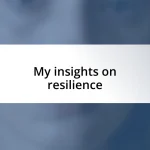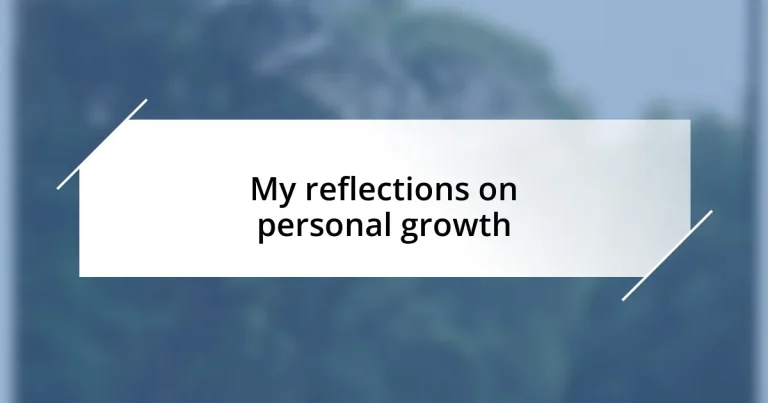Key takeaways:
- Personal growth emerges from introspection, discomfort, and self-awareness; journaling can clarify fears and aspirations.
- Identifying key growth areas necessitates honest reflection, focusing on emotional health, skills development, relationships, work-life balance, and self-care.
- Setting specific, measurable, and flexible personal goals fosters sustainable growth, while embracing resilience and adaptability is crucial when facing challenges.
- Measuring progress involves both quantitative and qualitative assessments, with reflection helping to uncover insights beyond mere numbers.
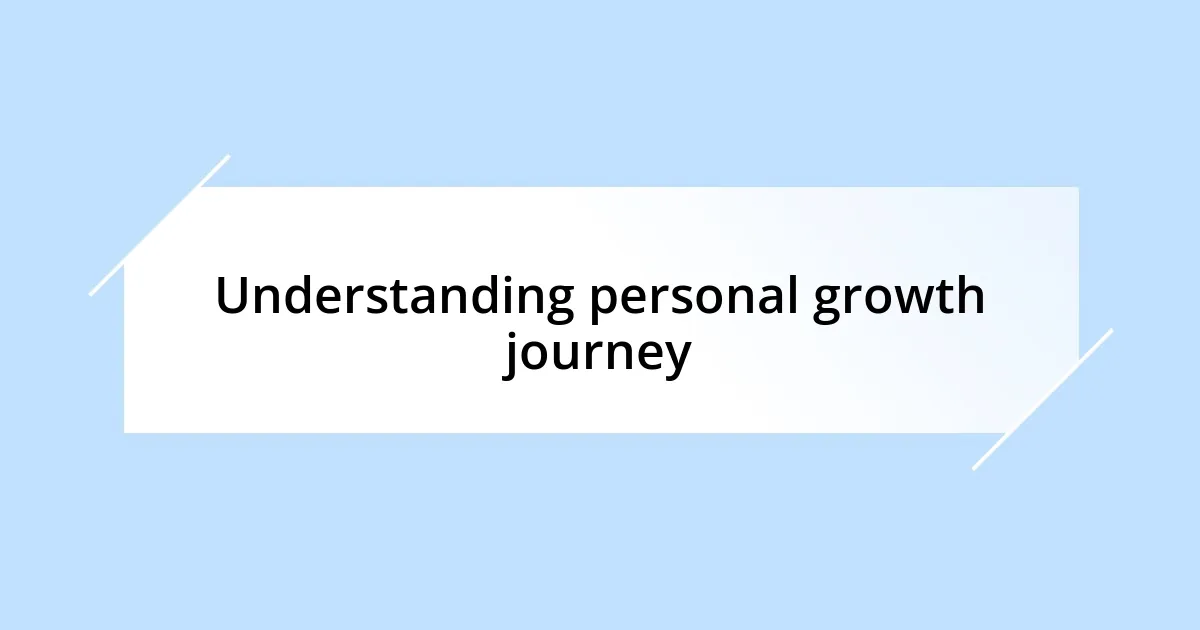
Understanding personal growth journey
Personal growth is a unique journey, often shaped by a blend of experiences and introspection. I remember a particularly tough period in my life when I felt lost, questioning every decision I had made. It was during those quiet moments of reflection that I realized growth often stems from discomfort; have you ever felt that way too?
As I navigated through my challenges, I began to appreciate the importance of self-awareness in this journey. I started journaling, recording my thoughts and emotions, which was a game-changer. This practice allowed me to confront my fears and aspirations, forcing me to ask myself: what do I truly want out of life? It’s fascinating how digging deep can shed light on paths we never knew existed.
Along the way, I learned that personal growth isn’t about reaching a destination; it’s about the evolution of your mindset. I found inspiration from mentors who candidly shared their struggles, reminding me that vulnerability is a strength. Isn’t it comforting to know that each step, whether forward or back, is part of our growth narrative?
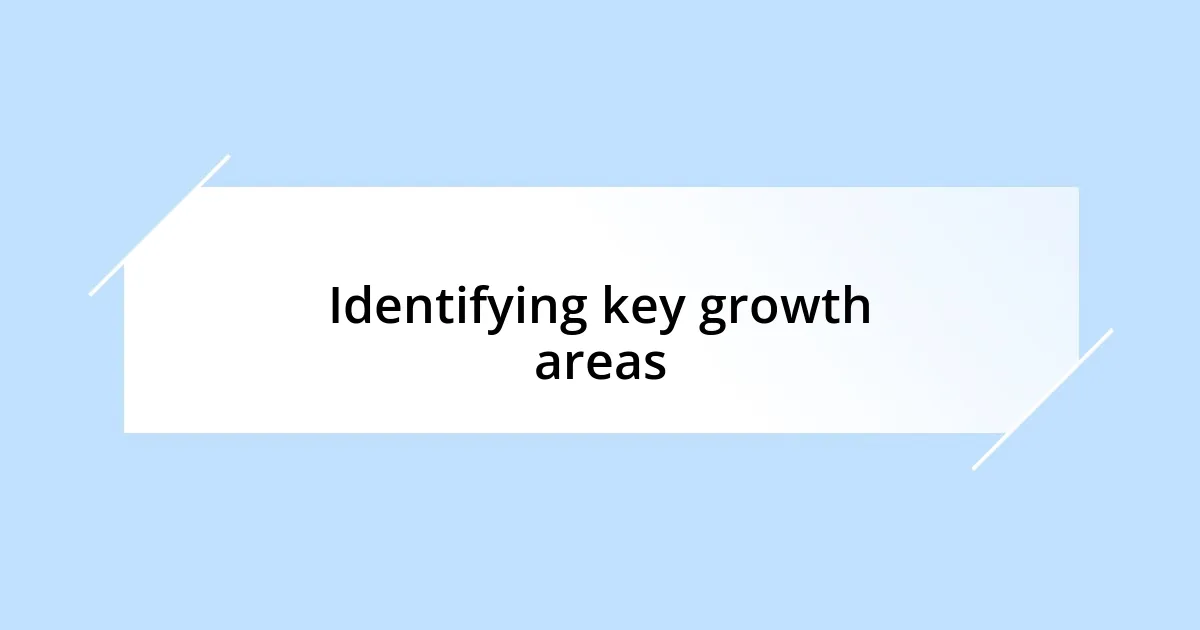
Identifying key growth areas
Identifying key growth areas is a deeply personal process that often requires introspection and honesty. I’ve experienced this firsthand; when I took the time to assess my life, I uncovered areas that needed nurturing, such as my communication skills and emotional resilience. It was an eye-opener to see how these aspects directly impacted my relationships and overall well-being.
To help identify key growth areas in your life, consider reflecting on the following:
- Emotional Health: Are there patterns in your emotional reactions that you’d like to change?
- Skills Development: What skills or knowledge do you feel would advance your career or personal interests?
- Relationships: Are there aspects of your relationships that feel unbalanced or strained?
- Work-Life Balance: How satisfied are you with your current balance between work and personal time?
- Self-Care: Are you allocating enough time for self-care practices that recharge you?
I remember sitting down one evening, feeling overwhelmed by the chaos in my life. It suddenly struck me how easy it was to ignore areas where I felt less confident. By writing down these aspects, I was able to clarify what needed my attention, leading me to insightful realizations and actionable steps. It was the beginning of a more fulfilling journey toward growth.
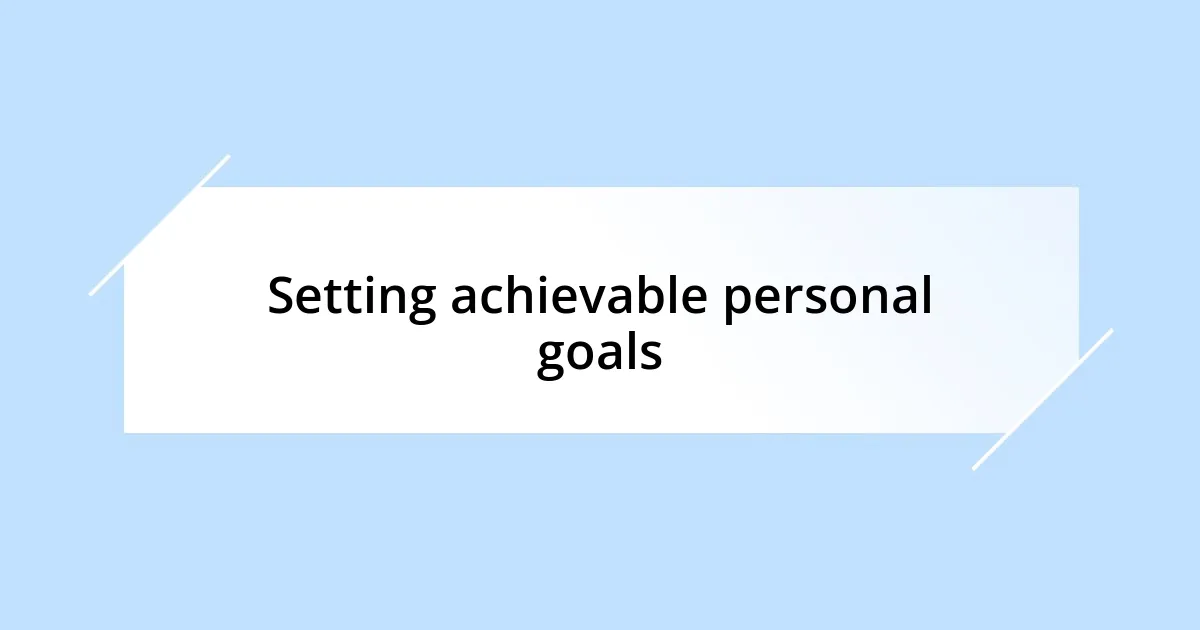
Setting achievable personal goals
Setting achievable personal goals is essential for sustainable growth and motivation. From my experience, I’ve found that breaking larger ambitions into smaller, manageable steps makes the process feel less daunting. For instance, when I aimed to read more, I started with just ten pages a day. It was surprising how quickly this small habit accumulated, leading me to finish book after book, all while keeping my motivation intact.
Another important aspect is ensuring that these goals are specific and measurable. I recall setting a vague goal like “get fit,” which ultimately left me frustrated. Instead, pinning down specific milestones, such as running a 5K or lifting a certain weight, provided clarity. It was these concrete targets that transformed my approach, allowing me to track progress effectively and celebrate small victories along the way.
Lastly, I believe that flexibility is crucial when setting personal goals. Life has a way of throwing curveballs that we can’t always anticipate. I once set a goal to learn a new language within a year, but personal circumstances shifted that timeline. By allowing myself the grace to adapt without feeling defeated, I learned that resilience in the face of change is a big part of personal growth.
| Goal Setting Element | Description |
|---|---|
| Specific | Clearly define what you want to achieve |
| Measurable | Track progress with quantifiable milestones |
| Achievable | Set realistic goals considering your current situation |
| Relevant | Ensure your goals align with your broader life aspirations |
| Time-bound | Set deadlines to create a sense of urgency |
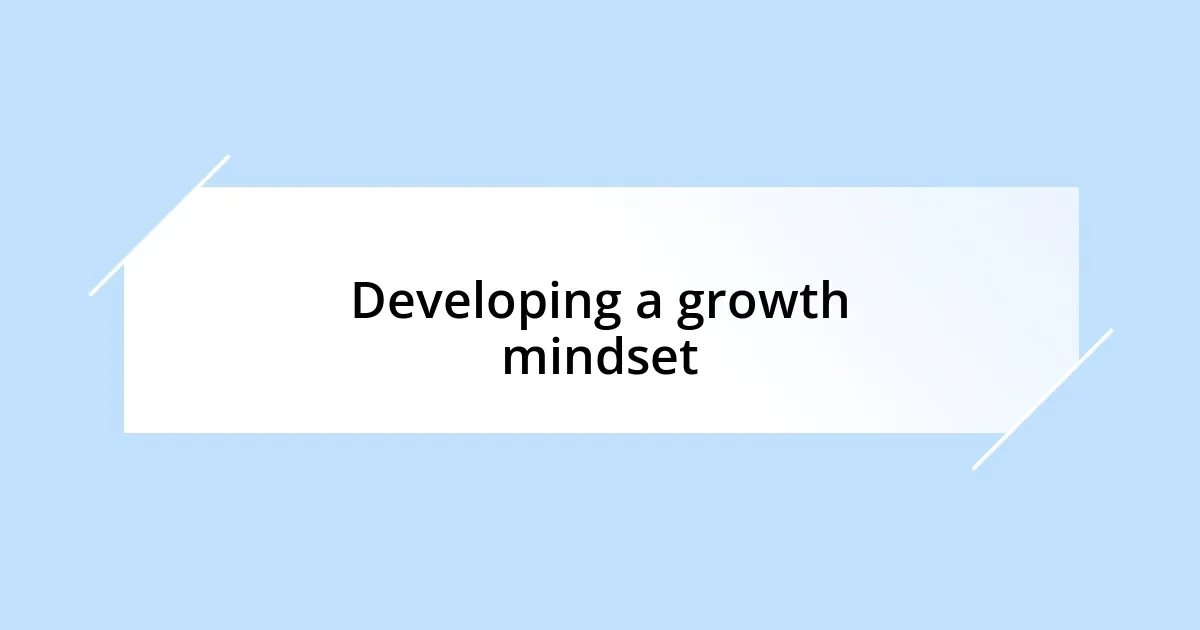
Developing a growth mindset
Developing a growth mindset is a transformative experience that changes how we view challenges. I still remember a time when I faced a daunting project at work; instead of feeling defeated, I chose to embrace it as an opportunity to learn. This shift in perspective not only eased my anxiety but also led to unexpected breakthroughs. Isn’t it interesting how a simple change in mindset can turn a source of stress into a pathway for growth?
I’ve also found that surrounding myself with supportive people encourages this growth-oriented thinking. When I started spending more time with individuals who embraced challenges and failures, it was inspiring. Their stories of perseverance reminded me that setbacks are merely stepping stones rather than roadblocks. Have you ever considered how your circle influences your mindset? It can make a world of difference.
Lastly, I think it’s vital to practice self-compassion as we develop our growth mindset. In the past, I often chastised myself for not meeting expectations, which only stifled my motivation. Once I learned to treat myself with kindness—acknowledging my effort rather than just the outcome—I noticed a significant shift. This approach allows me to embrace mistakes as part of the journey, fostering resilience and propelling me toward continuous improvement. How do you respond when things don’t go as planned? Embracing our imperfections can truly be liberating.
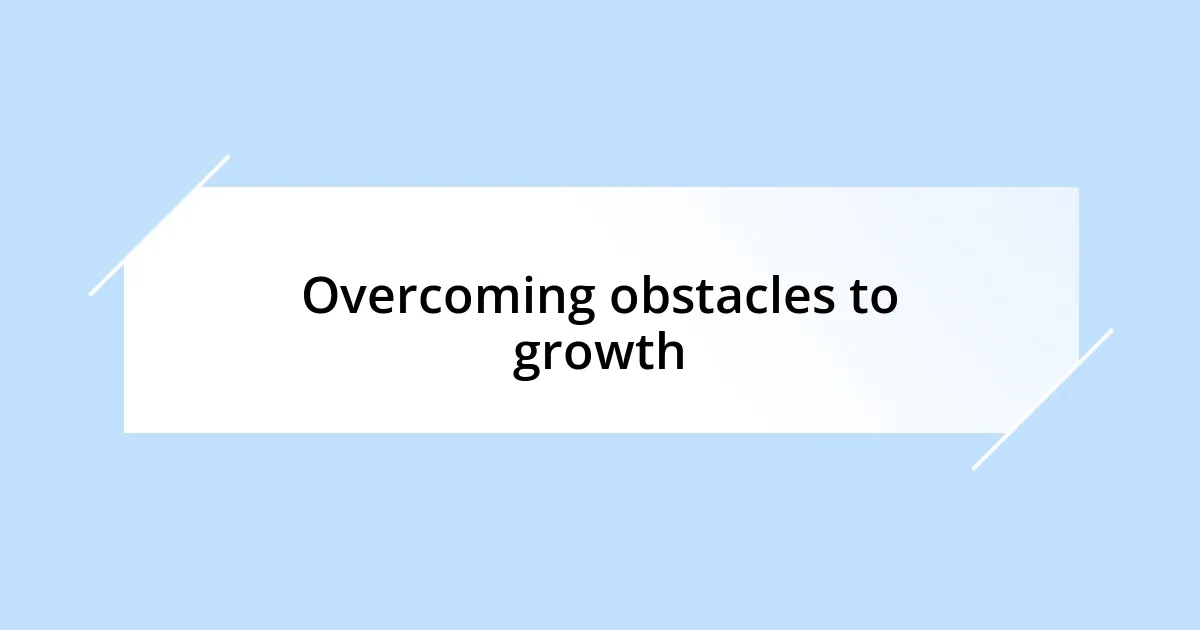
Overcoming obstacles to growth
Overcoming obstacles to growth is an essential part of any personal journey. I remember when I hit a massive setback in my career. I had poured my heart and soul into a project, only to see it fall flat. At that moment, I thought of giving up, but instead, I chose to reflect on what went wrong. This introspection not only helped me identify my weaknesses but also ignited a determination to improve. Isn’t it fascinating how failure can sometimes serve as our greatest teacher?
There’s something powerful about embracing discomfort. I once participated in a public speaking workshop, which terrified me. With each uncomfortable moment on stage, I felt my confidence begin to shift. I realized that facing these fears head-on opened new doors for personal growth. Have you ever pushed past a fear that unveiled something you weren’t aware of within yourself? Confronting those obstacles often reveals strengths we didn’t even know we had.
Another pivotal aspect I found was the importance of patience. Early on, I often expected immediate results, which led to frustration. It wasn’t until I committed to a daily journaling practice that things began to change. Slowly but surely, I noticed how my reflections shaped my thoughts and actions. How many times have you felt the urge to rush through your growth? Embracing the journey, rather than fixating on the destination, has been a vital lesson in my growth path.
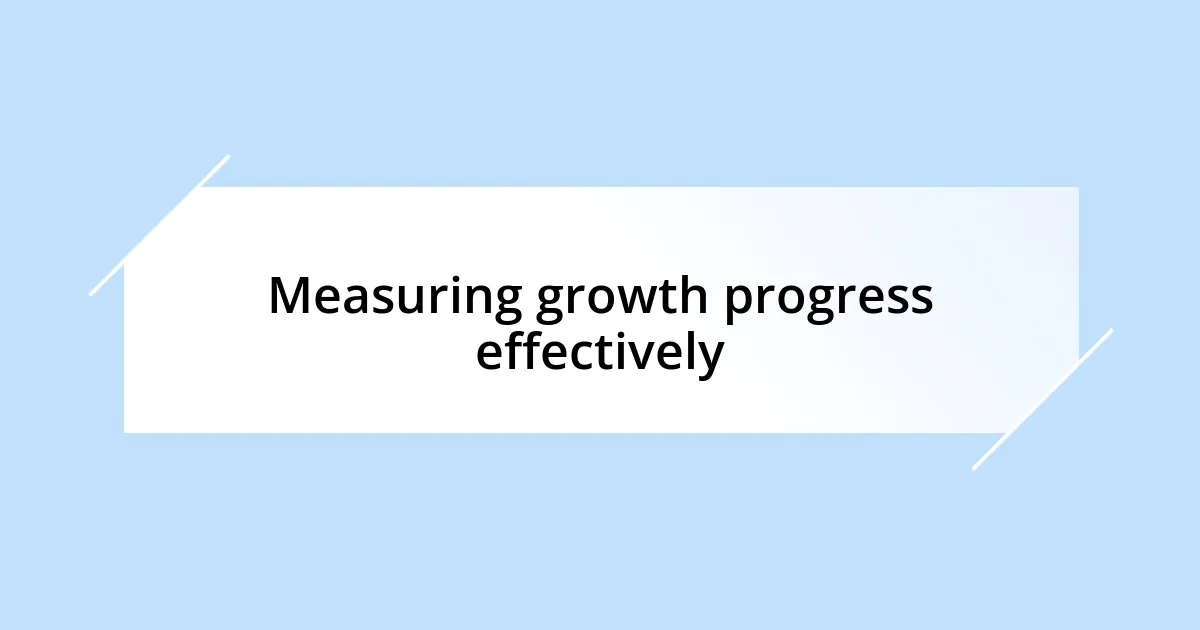
Measuring growth progress effectively
Measuring growth progress effectively is a nuanced endeavor, as it requires both quantitative and qualitative assessment. I remember grappling with how to gauge my progress in developing new skills. I started keeping a week-by-week log of my achievements, big or small. This way, I could not only see where I had improved but also celebrate those little wins that often go unnoticed. Have you ever recognized how those small milestones can fuel your motivation?
I’ve also found value in setting specific, actionable goals. A few months ago, I decided to improve my communication skills. I set a target to engage in at least one meaningful conversation daily with colleagues. Tracking these interactions revealed patterns in my growth that I hadn’t anticipated. Isn’t it interesting how breaking things down can provide clarity and insight into your development?
Reflection plays a crucial role, too. After a particularly challenging week, I took the time to look back and ask myself what I learned from my experiences. This process of self-reflection often uncovers insights that numbers alone can’t convey. For instance, I discovered that my confidence had increased in team meetings, though my speaking time hadn’t expanded much. How do you assess your progress, beyond just numbers? Understanding the emotional landscape of growth can be incredibly enriching.
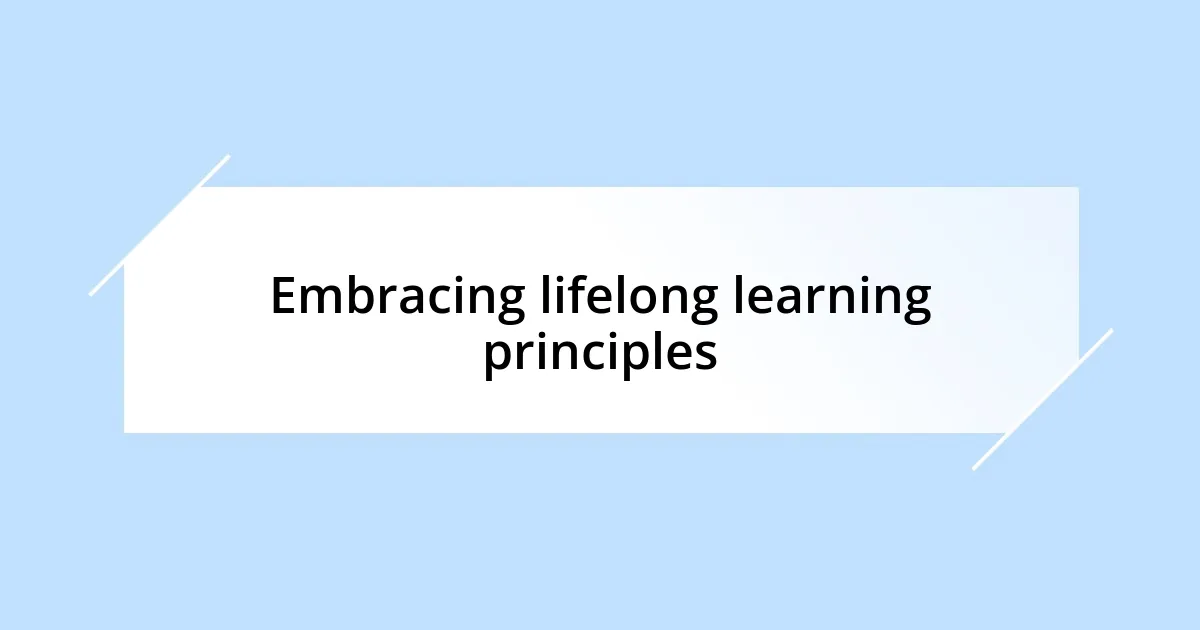
Embracing lifelong learning principles
Embracing lifelong learning is about acknowledging that our education doesn’t end after formal schooling. I vividly remember the day I decided to enroll in an online coding course. Initially, the thought of stepping back into a learning environment felt daunting. But as I tackled each module, the excitement of acquiring a new skill overshadowed my fears. Have you ever felt that spark when discovering something new that ignites your passion for learning?
In my experience, fostering a habit of curiosity has been transformative. I’ve often found myself diving deep into topics that pique my interest—like philosophy or photography—just for the joy of it. This exploration goes beyond the confines of work or obligation, reminding me that learning is a journey with no end point. How can we cultivate a mindset that seeks knowledge not just for utility but for the joy it brings? I believe it’s essential to embrace this curious nature, as it leads to personal enrichment in unexpected ways.
Moreover, surrounding myself with diverse perspectives has enhanced my learning journey significantly. I recall attending a seminar where speakers came from backgrounds vastly different from mine. Listening to their stories reshaped my understanding of various subjects and encouraged me to think critically about my assumptions. Isn’t it fascinating how engaging with varied viewpoints can challenge our thought processes and promote growth? Embracing lifelong learning means welcoming these diverse interactions that can fundamentally change how we perceive the world.











